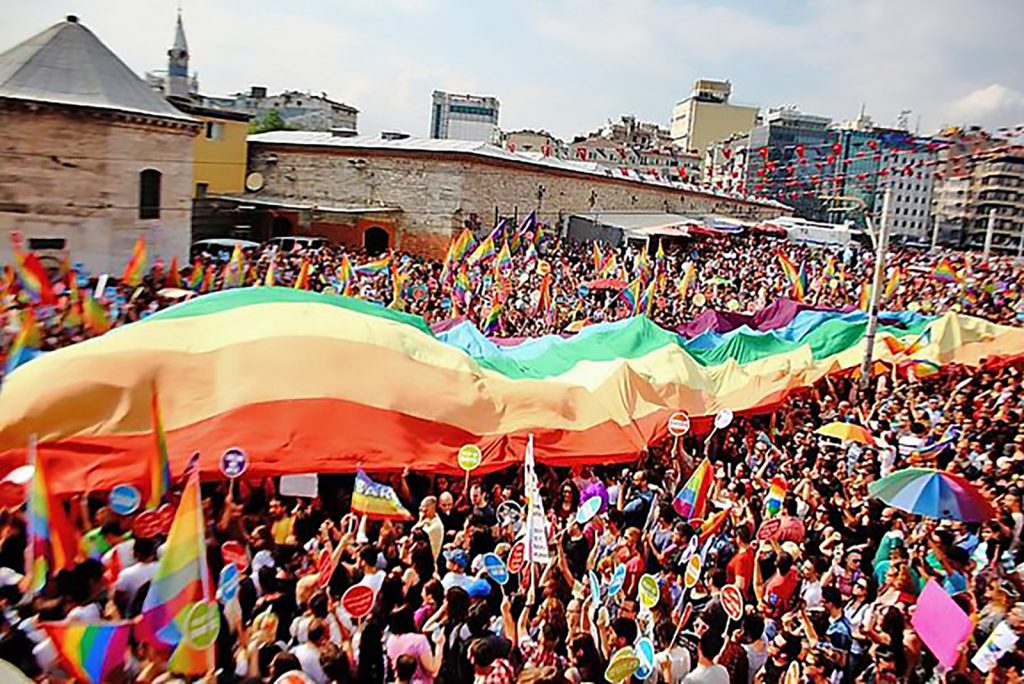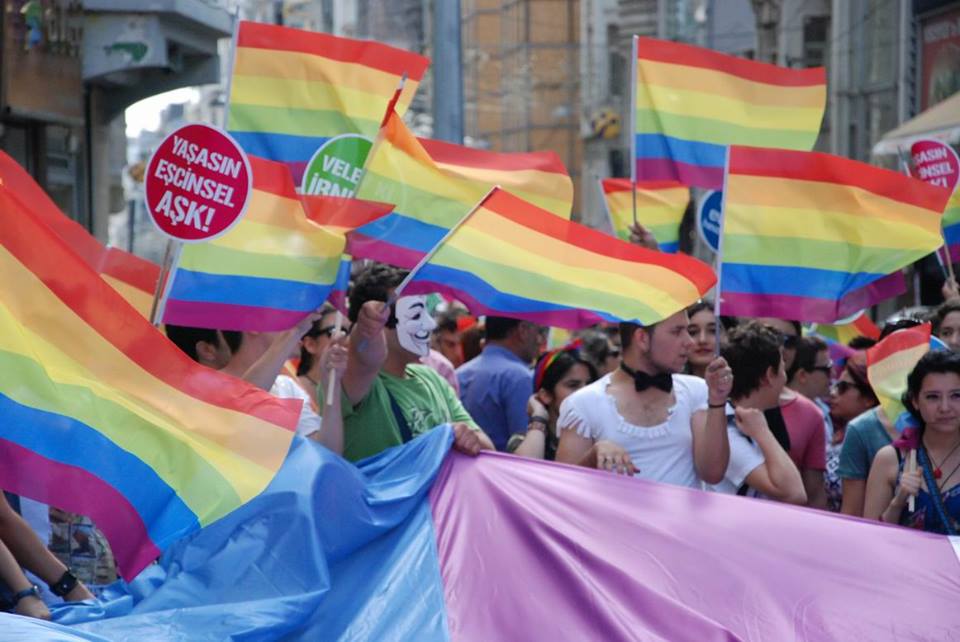In Turkey, LGBTI+ events and queer people’s right to assembly face increasing restrictions. This, writes Didem Unal Abaday, will only get worse in the new parliamentary term after the 2023 elections. As the 100th anniversary of the Turkish Republic approaches, Turkey is turning into a social laboratory where political homophobia is transformed into state policy
The heated election period in the spring of 2023 was marked by a homophobic, hateful political campaign from AKP (Justice and Development Party), the ruling party since 2002. Soon after, on 25 June, hundreds of demonstrators took to the streets with rainbow flags, in Istanbul and many other Turkish cities, for the 21st Pride Walk.
There was no official ban to outlaw the pride walk. Regardless, police blocked the central Taksim Square, a popular meeting point downtown, and detained over a hundred demonstrators, activists and journalists.

Prior to the Walk, the Istanbul governor vowed on social media that there would be 'no permission for events that threaten the institution of family'. The framing of LGBTI+ events as 'a threat to family' is at the core of political homophobia in contemporary Turkey. It enables AKP to justify the prohibition of people’s right to peaceful assembly without evidence of threat to public order. According to the International Lesbian, Gay, Bisexual, Trans and Intersex Association’s 2023 Rainbow Index, Turkey ranks second-worst in Europe for anti-LGBTI+ attacks and rights violations.
The pride walks were banned for the first time in 2015. Since then, restrictions on LGBTI+ related events have become commonplace in Turkey. In the aftermath of a failed coup d’état in 2016, the government declared a state of emergency, which lasted for two years. This gave AKP a pretext for a massive but selective crackdown on civil society. In particular, it targeted feminist and LGBTI+ activists, deeming them 'immoral' and anti-nationalist.
In the post-2019 period, the government authorities imposed further restrictions on pride walks and feminist protests by instrumentalising the Covid-19 pandemic. This provided an opportunity to justify the suppression of minoritised subjects.
AKP instrumentalised Covid-19 restrictions, exploiting them to justify the suppression of minorities
During the same period, the government authorities permitted anti-gender rallies, known as Great Family Meetings. These meetings rely heavily on homophobic hate speech and generally urge the government to pursue a homophobic policy vision. AKP MPs and local party officials often take part in them, publicly declaring support for these meetings' ideological cause.
This selective, systematic crackdown on the LGBTI+ community only intensifies during Pride month. New bans, arrests, detentions and obstructions outlaw even low-profile picnics, film screenings, and tea parties.

Since 2003, Pride Walks have exemplified the expansion of LGBTI+ social and physical spaces in millennial Turkey. In the last permitted pride parade, in Istanbul in 2015, nearly 50,000 people took to the streets. Since 2015, despite the authorities’ restrictions, LGBTI+ activists have mobilised successfully. They adopted dissident slogans such as 'we will not leave the streets' and 'you will get used to us', and made effective use of digital platforms.
The press briefing for the 2023 pride walk expressed a sentiment of queer revolt. It placed particular focus on the criminalisation of the LGBTI+ community during and after the recent election period:
What we witnessed in the post-election period was that the LGBT community was targeted in the very first speech following the announcements of the elections results. We do not accept this politics of hate and denial
LGBTI+ activist, BIANET.ORG
The recent election exposed clearly the government’s broader negative campaign aimed at suppressing and marginalising the LGBTI+ community. AKP’s political homophobia is not new. However, during the election period, it elevated homophobia to extreme levels, and turned it into a populist propaganda tool.
AKP designated 'LGBT' a security threat to the nation, culture and family. It deemed homosexuality 'perverted', and antithetical to Islam. It also used support for LGBT rights as a smear tool to defame opposition politicians and frame them as 'the enemy'.
In its latest election campaign, AKP designated 'LGBT' a security threat, and deemed homosexuality antithetical to Islam
'14 May will be a day to teach a lesson to those who support LGBT', pledged President Erdoğan at an election rally in Gaziantep. He repeated this many times throughout his election campaign.
AKP accuses opposition parties of being 'LGBT supporters' and therefore against he 'Turkish' family structure. However, except for the pro-Kurdish People’s Democratic Party (HDP), no opposition party pledged manifesto support for LGBTI+ rights. Moreover, to secure votes from Islamist fundamentalists, AKP forged new political coalitions with right-wing extremist parties that promised to shut down all LGBTI+ associations in the post-election period.
During its new term, AKP is expected to expand its political homophobia into the legal realm. It will do this through constitutional designs that consolidate the regime’s commitment to protect the traditional family structure against the threat of 'corrupt gender ideology'.
AKP’s proposed constitutional amendment will likely be turned into a referendum in conjunction with the 2024 local elections. This will prepare the ground for shutting down all LGBTI+ associations by declaring them 'unconstitutional'.
It seems that AKP’s new term will be characterised by unprecedented rule-of-law backsliding. This will allow the government to translate its political homophobia into official state policy.
So demoralizing.... #SupportTurkishLGBT